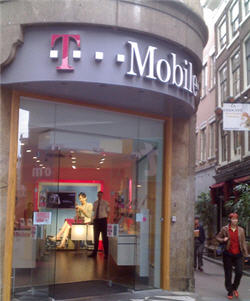
T-Mobile, member of Google’s Open Handset Alliance (OHA) will be the first carrier to copy Apple’s App Store approach and abandon the traditional on-deck model, Moconews’ Tricia Duryee reported last Friday. She wrote:
[aditude-amp id="flyingcarpet" targeting='{"env":"staging","page_type":"article","post_id":96476,"post_type":"story","post_chan":"none","tags":null,"ai":false,"category":"none","all_categories":"mobile,","session":"D"}'] “Starting this fall, T-Mobile USA will take the extraordinary step of ditching its traditional deck on the phone and replacing it with a platform that’s open to almost any developer, multiple sources have told us. Think of *Apple’s* App Store, but for the entire carrier’s handset line-up from smartphone to feature phone. As one developer, who was briefed on the matter, said: “The App store was a big deal, but that’s one phone. This is an entire carrier.”
While the 60 million milestone may, deservedly, get the headlines, it’s this move by T-Mobile that should get people excited.
To truly appreciate what T-Mobile’s starting here, consider how carrier decisions are usually made: Product management decisions usually have to be given the okay by up to 50 parties. Typically, operators are organized into technology or revenue groups such as SMS, Voice or MMS. Additionally there may be various groups based on processes, countries, initiatives, etc.
AI Weekly
The must-read newsletter for AI and Big Data industry written by Khari Johnson, Kyle Wiggers, and Seth Colaner.
Included with VentureBeat Insider and VentureBeat VIP memberships.
One of these 50 may be a mobile data representative and another one the external applications/startup representative, both trying to get the external service “on-deck,” or pre-loaded on a carrier’s phones. But these representatives usually lose the boardroom battles.
The most important indicator in the board room negotiations is the ARPU (average revenue per user). And there’s a strong notion that the on-deck space is scarce and needs to be tightly arranged, controlled, and managed. For example, imagine a spreadsheet of 70 mobile services/applications with their ARPUs and total revenue listed. For the parties and the product manager in charge, the ARPU column of that spreadsheet is the only one that counts. And from the list of services/applications, it’s the voice- and SMS-based ones that get all the attention. Mobile data applications — despite PR sweet talk over recent months — tend to get left behind.
Meanwhile, application developers have to wait 3-18 months to find out if a carrier’s willing to put their application on-deck. If the process takes, say, 12 months and is finally successful, the developer has still burned 12 months of costs/VC funding. And still the operator can pull the plug at any moment. It’s hard to calculate any ROI in such an setup. Not surprisingly, prior to the Apple App Store, most VCs I know had lost their appetite for companies relying on on-deck deals.
So if T-Mobile moves to an off-deck model and other carriers follow, startups could see huge hurdles removed. In a similar fashion, the move could trigger a change in VC investment behavior.
In private conversations I’ve had with operator representatives, they admit how bad the situation is (my favorite quote is: “In our organization, usability is decided by lawyers.”). As I noted at the monetization data panel the MobileBeat 2008 conference, my sources indicate that U.S. operators had a combined 50-60 million downloads in the whole first quarter of this year, compared to the 60 million App Store downloads Apple was able to pull off single-handedly. Word is, this has led to a lot of embarrassment in operator board rooms. The move by T-Mobile USA can be seen as an official admission of the superiority of an app store vs. an on-deck distribution channel. Alternatively, since I hear from my sources that this move has been planned for months, and since T-Mobile is a member of Google’s Open Handset Alliance, you could say the T-Mobile store may be a “Google Android” store in the making. Either way, though, it’s a change in the competitive dynamics of the industry — making applications much more important.
Currently, in most countries, around 80 percent of all devices are sold in carrier stores. In these stores we buy a combination of device and data plan. In this game, operators compete on the access, control and transport layers of the network game and slightly on the device level. The application level is basically not important.
But with the recent news, I can now imagine walking into a T-Mobile store with my girlfriend after the new app store has launched and finding it organized like a music store — posters of the Top 10s, “new releases”, etc. up on the walls. My girlfriend wouldn’t ask me what device I recommend. She’d just take the gadget that guarantees it can run her favorite applications. This vision may by the product of my imagination. But T-Mobile, if it launches its app store first, may be the first carrier to have some incentives to make something like this happen.
[aditude-amp id="medium1" targeting='{"env":"staging","page_type":"article","post_id":96476,"post_type":"story","post_chan":"none","tags":null,"ai":false,"category":"none","all_categories":"mobile,","session":"D"}']
[Photo credit: www.flickr.com/photos/bentley79]
VentureBeat's mission is to be a digital town square for technical decision-makers to gain knowledge about transformative enterprise technology and transact. Learn More
